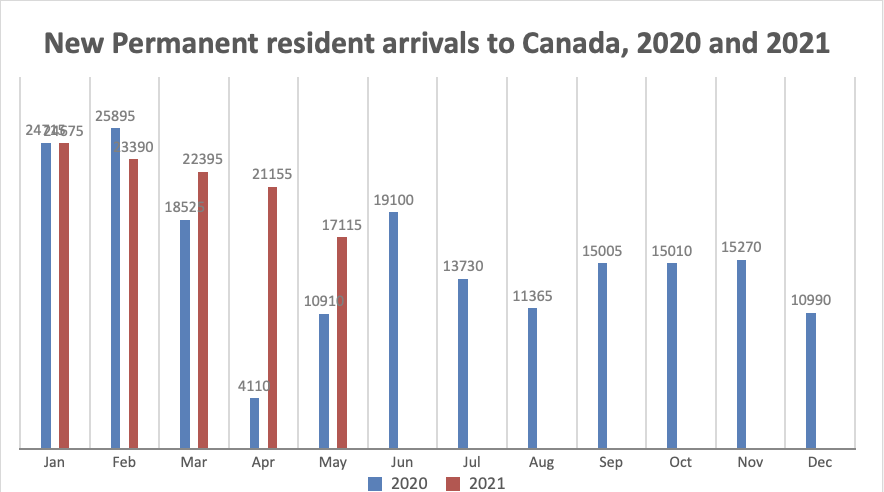
Canada recorded 17,115 new permanent resident arrivals in May, as immigration numbers dropped further behind the levels required to hit ambitious targets.
The number of arrivals, although greater than the same period of 2020, is the lowest monthly total of 2021. Since welcoming 24,675 newcomers in January, numbers have fallen every month.
Canada has welcomed 108,730 new permanent residents in the first five months of the year, up from 84,155 in the same period of 2020.
However, the current 2021 average of 21,746 newcomers per month would only give Canada a total of just over 260,000 immigrants for the year, against a target of 401,000.
Of crucial importance is Canada’s move to begin relaxing international travel restrictions in early July.
The initial step was the removal of the 14-day quarantine for fully vaccinated citizens, permanent residents, plus others allowed to travel, including work permit holders.
Canada is also now allowing in holders of Confirmation of Permanent Residence (COPR) documents issued after March 20, 2020, opening up another source of thousands of new immigrants.
Ottawa is clearly expecting a major increase in the rest of 2021, boosted by the new pathway the permanent residence launched in May, through which it expects to receive 90,000 applications from international graduates, healthcare workers and other essential workers.
Meanwhile, Immigration, Refugees and Citizenship Canada (IRCC) has also significantly increased the numbers of Invitations to Apply being issued through Express Entry, with two consecutive record quarters in which more than 40,000 ITAs were given out.
These candidates, 90 percent of them already in Canada, are likely to make the transition to permanent residency in the second half of the year.
Immigration Minister Marco Mendicino remains confident Canada will hit the 401,000 targets, set in the fall 2020 immigration levels plan.
Read More
British Columbia: COVID-19 Causes Drop In Number of Immigrant Sales and Service Workers
How Canada Immigration Responded To COVID-19 In The First Half of 2021
COVID-19: Quarantine Requirement To End For Fully Vaccinated International Students
Strict COVID-19 restrictions on non-essential international travel imposed by Ottawa since March 2020 dramatically cut the number of newcomers by almost half last year, to 184,370 from 341,175 in 2019.
Despite the restrictions still being in place, Canada has once again displayed its ability to pivot its immigration policies to attract newcomers to help foster economic recovery as the coronavirus crisis abates.
Canada has enhanced screening measures and pre-arrival testing for anyone entering the country’s land or air borders and a 14-day quarantine for non-essential travellers.
All travellers coming to Canada by air for non-essential reasons need to stay in government-designated hotels for three days at their own costs after getting a COVID-19 test.
Ottawa recently extended its restrictions on international travel to Canada and the Canada-U.S. border until July 21. It remains to be seen whether the restrictions will be extended by a further month.
Canada currently has exemptions in place for the following people, provided they are travelling for a non-discretionary reason.
- Seasonal agricultural workers, fish/seafood workers, caregivers and all other temporary foreign workers.
- International students who held a valid study permit, or had been approved for a study permit, when the travel restrictions took effect on March 18, 2020. More international students will be allowed to travel from October 20 under a new exemption.
- Permanent resident applicants who had been approved for permanent residence before the travel restrictions were announced on March 18, 2020, but who had not yet travelled to Canada.
- Immediate family members of Canadian citizens and permanent residents are also exempt if entering to be with an immediate family member for at least 15 days.
- Extended family members of citizens and permanent residents, plus foreign nationals travelling on compassionate grounds.
Canada’s vaccine campaign has been successful in driving down COVID-19 case numbers, with officials emphasizing the importance of the second dose.
However, with other countries with high vaccination numbers still struggling with increasing case numbers due to COVID-19 variants, it remains to be seen whether the same problem will affect Canada.


